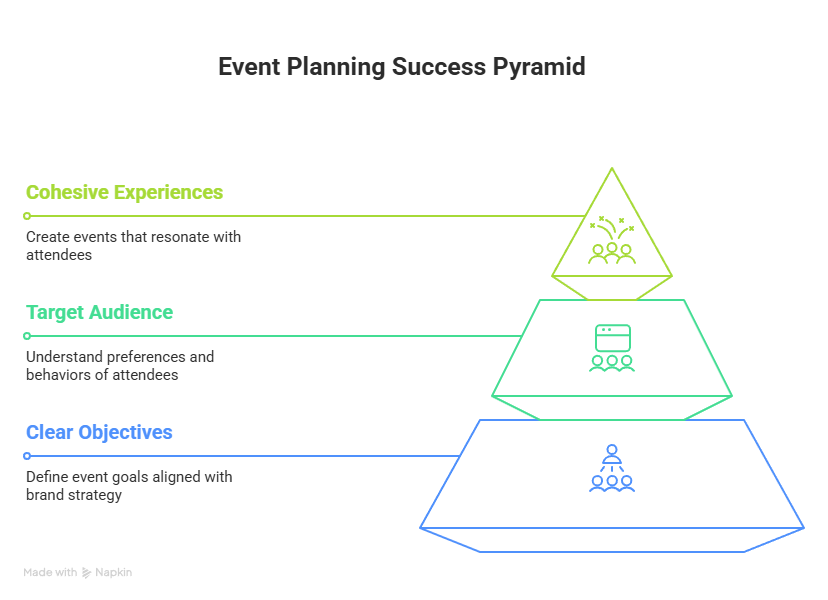Planning a successful brand event requires strategy, creativity, and attention to detail. A comprehensive event plan serves as the roadmap that aligns your brand goals with practical execution steps, ensuring that your activation stands out and delivers meaningful results.
Key Takeaways:
- Dedicated staff is crucial for successful brand representation
- Below-the-line marketing with a “WOW FACTOR” helps brands stand out
- Professional training ensures consistent brand messaging
- Personal service matters regardless of event size
- Measurable results should guide planning and execution
Understanding the Foundations of Effective Event Planning
Every successful event plan starts with clear objectives. What do you want to achieve? Brand awareness, lead generation, product launches, or customer engagement all require different approaches.
Ask yourself: How does this event support our overall brand strategy? When you align your event goals with your brand’s mission, you create cohesive experiences that resonate with attendees.
Identifying your target audience is equally important. Understanding their preferences, behaviors, and expectations helps you design touchpoints that genuinely connect with them. This foundation forms the basis of every decision in your event planning process.

Creating the “WOW FACTOR” in Your Event Plan
Standing out from competitors requires adding unique elements to your event. At JR Promotions, we specialize in creating that essential “WOW FACTOR” through below-the-line marketing strategies that spotlight your brand and showcase your story.
Consider these elements to make your event memorable:
- Interactive brand experiences that engage multiple senses
- Photo opportunities designed for social sharing
- Unexpected moments that create emotional connections
- Personalized interactions with attendees
The balance between creative vision and practical execution is critical. Even the most innovative ideas need solid implementation plans to succeed.
Building a Promotional Dream Team
Your brand ambassadors are the face of your event. Selecting dedicated, experienced, and well-trained promotional staff significantly impacts how attendees perceive your brand. Every team member should thoroughly understand your brand values, voice, and objectives.
Training protocols ensure consistent messaging across all interactions. Regular promoter training sessions equip staff with the necessary knowledge for successful activations. This investment in your team directly affects your event’s success.
Professional Event Management From Concept to Execution
Whether you’re planning a small product demonstration or a major corporate event, professional service remains essential. Every client deserves personal attention and expert guidance throughout the planning process.
Quality control measures should include:
- Regular planning checkpoints
- Detailed execution timelines
- Clear communication channels
- Comprehensive staff briefings
These elements help deliver a seamless extension to your brand through effective planning, management, and execution solutions.
Staff Selection for Maximum Impact
The process of building your event team should be thorough. Each promoter should be interviewed, screened, and trained before being approved for brand activations. Look for individuals who can authentically represent your brand values while engaging effectively with your target audience.
Budget Planning and Cost Optimization
Creating realistic event budgets that deliver return on investment is crucial. In South Africa, event costs can range from R10,000 for small activations to R500,000+ for major events.
| Event Component | Typical Budget Range (Rand) |
|---|---|
| Venue Hire | R5,000 – R50,000 |
| Promotional Staff | R1,500 – R2,500 per promoter/day |
| Branding Materials | R10,000 – R100,000 |
| Technology | R5,000 – R30,000 |
| Logistics | R3,000 – R20,000 |
Smart resource allocation maximizes brand impact while controlling costs. Consider working with an experienced events manager who can help identify cost-saving opportunities without compromising quality.
Measuring Success: Performance Metrics
Establish clear KPIs aligned with your event objectives before planning begins. These might include:
- Number of qualified leads generated
- Social media engagement metrics
- Brand recall improvements
- Direct sales outcomes
- Attendee satisfaction scores
Post-event feedback collection through surveys, interviews, and social listening provides valuable insights for future improvements. Successful brand ambassadors can also provide firsthand feedback about attendee reactions and engagement.
Creating Event Plans That Deliver Lasting Brand Impact
Bringing all elements together requires coordination, attention to detail, and adaptability. The most successful events maintain flexibility while staying true to core brand objectives. By carefully selecting your team, adding creative “WOW” elements, and measuring your results, you create a framework for continuous improvement.
Have you considered how your next event could better showcase your brand story? With the right plan, your event can create lasting impressions that transform attendees into brand advocates.
Conclusion
A successful event plan combines strategic vision with practical execution details. By focusing on dedicated staff, creative marketing approaches, and measurable outcomes, you create brand experiences that truly stand out in today’s competitive landscape.